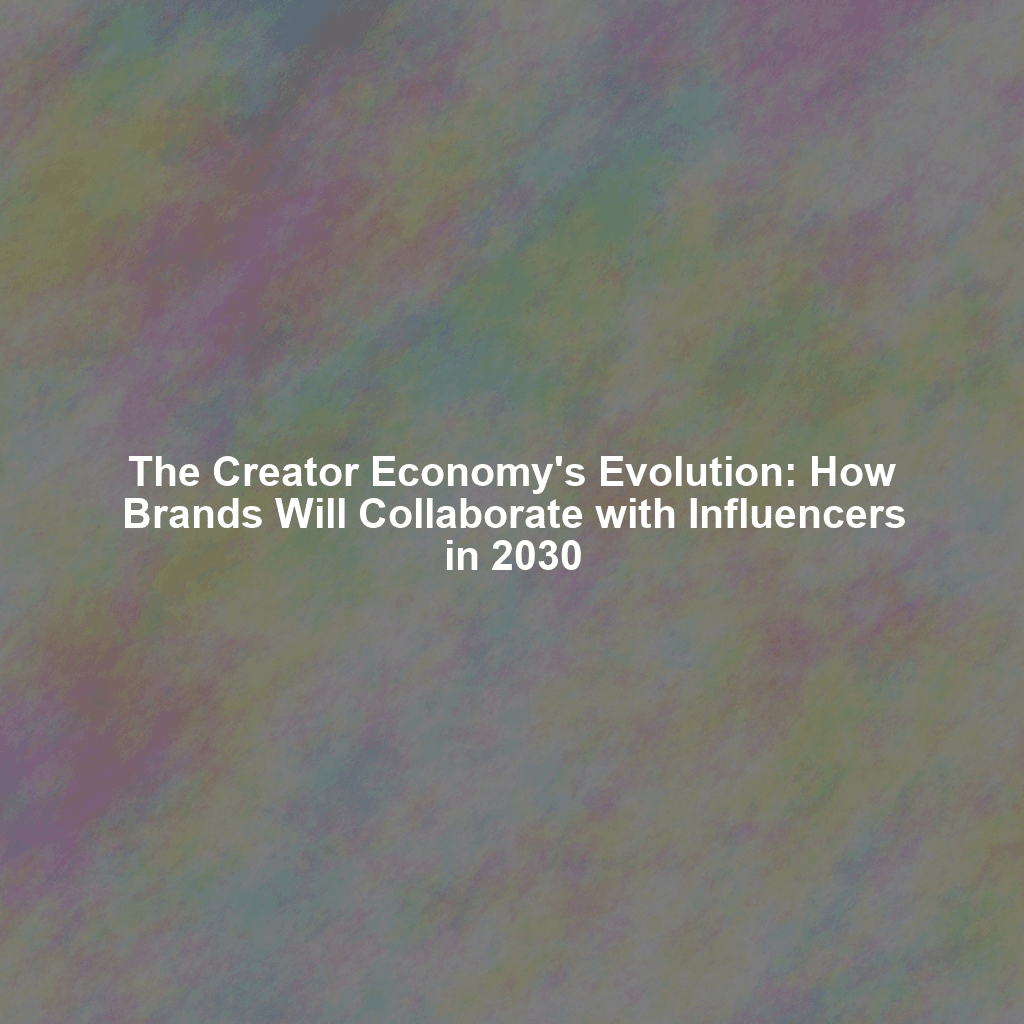The marketing landscape is a constantly evolving organism, and the creator economy is one of its most dynamic and impactful limbs. As we look ahead to 2030, it’s clear that the relationship between brands and influencers will continue to transform. Gone are the days of fleeting endorsements and superficial sponsorships. The future of influencer marketing is built on long-term partnerships, hyper-targeted reach through micro-influencers, and an unwavering commitment to authenticity and transparency. Let’s dive into how these trends will shape the creator economy in the years to come.
The Rise of Enduring Partnerships: Beyond the One-Off Campaign
In 2030, brands will prioritize cultivating long-term, strategic partnerships with creators rather than relying on isolated campaigns. This shift is driven by a growing understanding that authentic influence takes time to build. Consumers are increasingly savvy and can easily spot insincere endorsements. A lasting partnership allows creators to genuinely integrate a brand’s message into their content, building trust and credibility with their audience.
Benefits of Long-Term Collaboration
- Enhanced Authenticity: Creators can organically weave brand messaging into their content over time, making it feel less like an advertisement and more like a natural recommendation.
- Deeper Audience Connection: Consistent exposure to a brand through a trusted creator fosters stronger brand recognition and loyalty.
- Improved Content Quality: With a longer-term commitment, brands and creators can collaborate on developing richer, more engaging content that resonates with the target audience.
- Data-Driven Optimization: Continuous collaboration provides a wealth of data that can be used to refine marketing strategies and optimize campaign performance.
Micro-Influencers: The Power of Niche Communities
While mega-influencers still hold sway, the real growth in 2030 will be driven by micro- and nano-influencers. These individuals, with their smaller but highly engaged audiences, offer brands a unique opportunity to connect with niche communities in an authentic and impactful way. Their expertise and genuine passion resonate deeply with their followers, making their recommendations incredibly persuasive.
Why Micro-Influencers Will Dominate
- Higher Engagement Rates: Micro-influencers typically have significantly higher engagement rates compared to larger influencers, as they are more likely to interact directly with their followers.
- Authenticity and Trust: Their relatability and genuine passion for their niche make them incredibly trustworthy in the eyes of their audience.
- Cost-Effectiveness: Micro-influencer campaigns are often more budget-friendly than those involving larger influencers, making them accessible to a wider range of brands.
- Targeted Reach: Brands can precisely target their desired audience by partnering with micro-influencers who specialize in specific niches and demographics.
Authenticity and Transparency: The Cornerstones of Trust
In the increasingly discerning digital landscape of 2030, authenticity and transparency will be paramount. Consumers are no longer willing to tolerate misleading or deceptive marketing practices. Brands and influencers must be upfront about sponsored content and clearly disclose any financial relationships. Building trust with the audience will be the key to long-term success.
Building Trust Through Authenticity
- Genuine Recommendations: Creators should only endorse products or services that they genuinely believe in and have personally used.
- Open Communication: Brands and influencers should be transparent about their collaboration and clearly disclose any sponsored content.
- Real Storytelling: Focus on creating authentic stories that resonate with the audience and showcase the value of the brand in a meaningful way.
- Ethical Practices: Adhere to ethical marketing guidelines and avoid deceptive or misleading advertising tactics.
The Metaverse and Immersive Experiences: A New Frontier for Influencer Marketing
The metaverse will offer entirely new avenues for influencer marketing in 2030. Brands will collaborate with virtual influencers and creators to develop immersive experiences within virtual worlds. This could involve sponsoring virtual events, creating branded avatars, or even developing interactive games featuring influencers. The possibilities are endless, and the potential for engaging with consumers in innovative ways is immense.
Opportunities in the Metaverse
- Virtual Influencers: AI-powered virtual influencers will continue to gain popularity, offering brands a controlled and customizable way to engage with audiences in the metaverse.
- Immersive Brand Experiences: Creators can help brands develop interactive experiences within virtual worlds, allowing consumers to connect with products and services in a unique and engaging way.
- Virtual Events and Sponsorships: Brands can sponsor virtual events and concerts featuring influencers, reaching a global audience in a dynamic and interactive environment.
Data Privacy and Ethical Considerations
As the creator economy continues to evolve, it’s crucial to address the ethical considerations surrounding data privacy and responsible marketing. Brands and influencers must prioritize data security and transparency in their practices. Consumers are increasingly concerned about how their data is collected and used, and it’s essential to build trust by adhering to strict data privacy regulations.
Ensuring Ethical Practices
- Data Privacy Compliance: Adhere to data privacy regulations such as GDPR and CCPA to protect consumer data.
- Transparent Data Collection: Be transparent about how data is collected and used in influencer marketing campaigns.
- Responsible Content Creation: Avoid promoting harmful or misleading content that could negatively impact consumers.
Conclusion: Embracing the Future of Collaboration
The creator economy in 2030 will be defined by authentic connections, long-term partnerships, and a focus on building trust with consumers. Brands that embrace these trends and prioritize genuine collaboration with influencers will be best positioned to succeed in the ever-evolving marketing landscape. By investing in long-term relationships, leveraging the power of micro-influencers, and upholding the highest standards of authenticity and transparency, brands can unlock the full potential of the creator economy and forge meaningful connections with their target audiences.
 Skip to content
Skip to content

